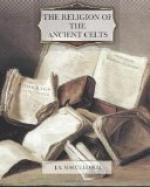The divinities often united with mortals. Goddesses sought the love of heroes who were then sometimes numbered among the gods, and gods had amours with the daughters of men.[518] Frequently the heroes of the sagas are children of a god or goddess and a mortal,[519] and this divine parentage was firmly believed in by the Celts, since personal names formed of a divine name and _-genos_ or _-gnatos_, “born of,” “son of,” are found in inscriptions over the whole Celtic area, or in Celtic documents—Boduogenos, Camulognata, etc. Those who first bore these names were believed to be of divine descent on one side. Spirits of nature or the elements of nature personified might also be parents of mortals, as a name like Morgen, from Morigenos, “Son of the Sea,” and many others suggest. For this and for other reasons the gods frequently interfere in human affairs, assisting their children or their favourites. Or, again, they seek the aid of mortals or of the heroes of the sagas in their conflicts or in time of distress, as when Morrigan besought healing from Cuchulainn.
As in the case of early Greek and Roman kings, Celtic kings who bore divine names were probably believed to be representatives or incarnations of gods. Perhaps this explains why a chief of the Boii called himself a god and was revered after his death, and why the Gauls so readily accepted the divinity of Augustus. Irish kings bear divine names, and of these Nuada occurs frequently, one king, Irel Faith, being identified with Nuada Airgetlam, while in one text nuadat is glossed in rig, “of the king,” as if Nuada had come to be a title meaning “king.” Welsh kings bear the name Nudd (Nodons), and both the actual and the mythic leader Brennus took their name from the god Bran. King Conchobar is called dia talmaide, “a terrestrial god.” If kings were thought to be god-men like the Pharaohs, this might account for the frequency of tales about divine fatherhood or reincarnation, while it would also explain the numerous geasa which Irish kings must observe, unlike ordinary mortals. Prosperity was connected with their observance, though this prosperity was later thought to depend on the king’s goodness. The nature of the prosperity—mild seasons, abundant crops, fruit, fish, and cattle—shows that the king was associated with fertility, like the gods of growth.[520] Hence they had probably been once regarded as incarnations of such gods. Wherever divine kings are found, fertility is bound up with them and with the due observance of their tabus. To prevent misfortune to the land, they are slain before they grow old and weak, and their vigour passes on to their successors. Their death benefits their people.[521] But frequently the king might reign as long as he could hold his own against all comers, or, again, a slave or criminal was for a time treated as a mock king, and slain as the divine king’s substitute. Scattered hints in Irish literature




